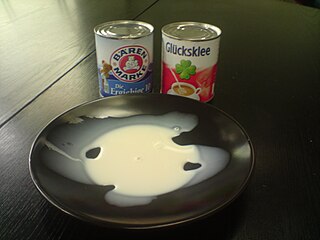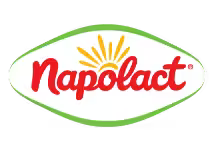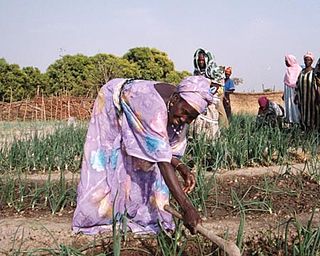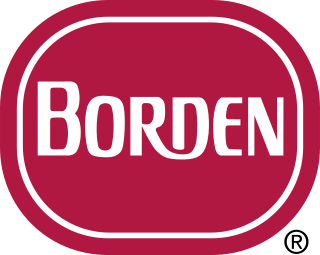
Condensed milk is cow's milk from which water has been removed. It is most often found with sugar added, in the form of sweetened condensed milk, to the extent that the terms "condensed milk" and "sweetened condensed milk" are often used interchangeably today. Sweetened condensed milk is a very thick, sweet product, which when canned can last for years without refrigeration if not opened. The product is used in numerous dessert dishes in many countries.

Evaporated milk, known in some countries as "unsweetened condensed milk", is a shelf-stable canned cow’s milk product for which approximately 60% of the water has been removed from fresh milk. It differs from sweetened condensed milk, which contains added sugar and requires less processing to preserve, as the added sugar inhibits bacterial growth. The production process involves the evaporation of 60% of the water from the milk, followed by homogenization, canning and heat sterilization.

Powdered milk, also called milk powder, dried milk, or dry milk, is a manufactured dairy product made by evaporating milk to dryness. One purpose of drying milk is to preserve it; milk powder has a far longer shelf life than liquid milk and does not need to be refrigerated, due to its low moisture content. Another purpose is to reduce its bulk for the economy of transportation. Powdered milk and dairy products include such items as dry whole milk, nonfat (skimmed) dry milk, dry buttermilk, dry whey products and dry dairy blends. Many exported dairy products conform to standards laid out in Codex Alimentarius.

Napolact is the main Romanian brand which belongs to the Dutch company FrieslandCampina and it’s one of the biggest dairy producers in Romania. It owns three production facilities in Cluj (Baciu), Târgu Mureș and Țaga.

Carnation is a brand of food products. The brand was especially known for its evaporated milk product created in 1899, then called Carnation Sterilized Cream and later called Carnation Evaporated Milk. The brand has since been used for other related products including milk-flavoring mixes, flavored beverages, flavor syrups, hot cocoa mixes, instant breakfasts, corn flakes, ice cream novelties, and dog food. Nestlé acquired the Carnation Company in 1985.

An agricultural cooperative, also known as a farmers' co-op, is a producer cooperative in which farmers pool their resources in certain areas of activity.

Vietnamese iced coffee is a traditional Vietnamese coffee recipe. It is created using coffee roasted between medium and dark. The drink is made by passing hot water through the grounds into a cup that already contains condensed milk. To serve the drink cold, ice is added to the cup.
Royal FrieslandCampina N.V. is a Dutch multinational dairy cooperative which is based in Amersfoort, Netherlands. It is the result of a merger between Friesland Foods and Campina on 30 December 2008. The European Commission approved the merger on 17 December 2008, on the condition that the new company divest some activities.

Borden, Inc., was an American producer of food and beverage products, consumer products, and industrial products. At one time, the company was the largest U.S. producer of dairy and pasta products. Its food division, Borden Foods, was based in Columbus, Ohio, and focused primarily on pasta and pasta sauces, bakery products, snacks, processed cheese, jams and jellies, and ice cream. It was best known for its Borden Ice Cream, Meadow Gold milk, Creamette pasta, and Borden Condensed Milk brands. Its consumer products and industrial segment marketed wallpaper, adhesives, plastics and resins. By 1993, sales of food products accounted for 67 percent of its revenue. It was also known for its Elmer's and Krazy Glue brands.

Vinamilk, formally the Vietnam Dairy Products Joint Stock Company is the largest dairy company in Vietnam. Based on the UNDP 2007 Top 200 largest firms in Vietnam report, it was also the 15th largest company in Vietnam and formerly the most valuable public company listed in Vietnam. In 2010, it is the first company in Vietnam to be included in the Forbes Asia's 200 Best Under A Billion list that highlights 200 top-performing small- and mid-sized companies with annual revenue under US$1 billion.

Chocomel is a Dutch brand of chocolate-flavoured milk, produced by FrieslandCampina in Aalter, Belgium. The brand's trademark is owned by FrieslandCampina.

FrieslandCampina Germany GmbH, former Campina GmbH, is a leading German dairy and subsidiary of the Dutch dairy cooperative FrieslandCampina. The company was formed in 1996 after the Stuttgart-based Südmilch AG was renamed.

Campina is a Dutch dairy cooperative. Main brands include Campina, Landliebe and Mona. In 2008, it merged with Royal Frieslands Foods. The name of the new company is FrieslandCampina.

Dutch Lady Milk Industries Berhad is a manufacturer of cow milk and dairy products in Malaysia, Singapore, Hong Kong, Brunei, Philippines and Vietnam since the 1960s. It was previously under Royal FrieslandFoods, a Netherlands-based multinational co-operative. Dutch Lady Malaysia is currently a subsidiary of FrieslandCampina, which was formed in December 2008 as a result of the merger between FrieslandFoods and Campina. Its current products include growing up milk, UHT milk, pasteurised milk, sterilised milk, family powdered milk, low fat and 0% fat drinking yoghurt, and low fat yoghurt.

Alaska Milk Corporation (AMC), commonly known as Alaska, is a Philippine dairy company headquartered in Makati. It was founded in 1972 by Wilfred Uytengsu Sr. The company is a subsidiary of Dutch dairy cooperative FrieslandCampina, which acquired control (98.1%) of the company from the founding Uytengsu family in 2012.

Longevity Brand is a brand of canned condensed milk, registered by FrieslandCampina and distributed by Sun Hing Foods, Inc. in the United States and Canada. It is a popular ingredient in Vietnamese iced coffee with milk drinks, and in various other Vietnamese desserts.

An egg coffee is a Vietnamese drink traditionally prepared with egg yolks, sugar, condensed milk and robusta coffee. The drink is made by beating egg yolks with sugar and condensed milk, then extracting the coffee into the cup, followed by a similar amount of egg cream, or egg yolks which are heated and beaten, or whisked.

FrieslandCampina Engro Pakistan Limited (FCEPL) is a Pakistani dairy products company which is a subsidiary of Dutch multinational cooperative FrieslandCampina. It is based in Karachi, Pakistan.


















